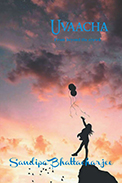
 |
Did I dare to drown your voice
In the clamour of medals won?
Did I… make this choice?"
Spanning the spectrum of emotions, Bhattacharjee delivers an intensely introspective observation on her journey in the material world and how a close relationship with the divine can transform the experience into a joyous spiritual one imbued with the understanding that we are all part and parcel of the supreme. Fittingly titled, the Sanskrit word uvaacha directly translates to “said” and is prominent in nearly every verse, including at the opening of the Bhagavad Gita. In the poet’s compilation, a clear relationship is established between the word, emotions, and earthly elements like Mother Nature.
From the get-go, Bhattacharjee’s nurturing temperament is prevalent. “Shree Ganesh,” for instance, is a tone-setter for the anthology as it simultaneously delivers on cultural elements while capturing the natural tendencies of the inquisitive and youthful mind. Often using an ABAB rhyme scheme, the poems convey a trancelike feeling, a peaceful knowing best exemplified by the juxtaposition of ego and enlightenment. In “Rara Avis,” for instance, the resplendent aura of a bird delivers a potent life lesson: life is most beautiful when it’s not caged but allowed to soar, free of divisions, avarice, and ego.
Although the poems cover a range of topics, the message is truly best captured and understood in “Lessons Learnt” and “One World,” where the imagery of humanity’s flag unfurled hits an eternally hopeful tone and something to strive for. In the third section of her compilation, Bhattacharjee turns to narrative prose and the power of storytelling to delve into lighthearted family time as well as foreshadow the final section, “Loss,” with an exploration of death and perspective in “Heart of Gold.” Above all else, Bhattacharjee’s poetry carries the potential to break free from the mechanical cycle of life and pettiness and to appreciate nature and one’s existence for the gift it is.
RECOMMENDED by the US Review